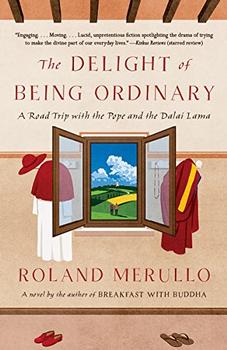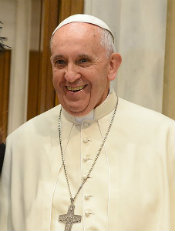Summary | Excerpt | Reading Guide | Reviews | Beyond the Book | Read-Alikes | Genres & Themes | Author Bio

A Road Trip with the Pope and the Dalai Lama
by Roland MerulloThis article relates to The Delight of Being Ordinary
In The Delight of Being Ordinary, Pope Francis invites the Dalai Lama along on a road trip through the Italian countryside.
 Pope Francis was born Jorge Mario Bergoglio on December 17, 1936, in Buenos Aires, Argentina. His father, Mario Jose Bergoglio (1908-1959) was an Italian immigrant who fled Italy in 1929 to escape Mussolini's fascist regime. His mother, Regina Mario Sivori (1911-1981), was the daughter of Italian immigrants. The eldest of five children, Jorge attended school in Buenos Aires, graduating as a chemical technician. He was hired as a laboratory tech, and also worked as a janitor and a bar bouncer to make ends meet.
Pope Francis was born Jorge Mario Bergoglio on December 17, 1936, in Buenos Aires, Argentina. His father, Mario Jose Bergoglio (1908-1959) was an Italian immigrant who fled Italy in 1929 to escape Mussolini's fascist regime. His mother, Regina Mario Sivori (1911-1981), was the daughter of Italian immigrants. The eldest of five children, Jorge attended school in Buenos Aires, graduating as a chemical technician. He was hired as a laboratory tech, and also worked as a janitor and a bar bouncer to make ends meet.
Inspired by a local priest, he felt called to enroll at the Inmaculada Concepcion Seminary in 1955, eventually becoming a novitiate of the Society of Jesus in 1958. He officially became a Jesuit on March 12, 1960. He proceeded to teach literature and philosophy while continuing his own studies, declaring his allegiance to the Pope on April 22, 1973, thereby sealing his vow of poverty, chastity and obedience.
He continued as a teacher and rose through the ranks of the Catholic clergy, becoming a bishop of Buenos Aires in 1992 and being appointed Archbishop in 1997; Pope John Paul II made him cardinal in 2001. He became increasingly well known for his humility and his commitment to the poor. During his tenure as archbishop he was nicknamed the "slum bishop" because he so dramatically increased the number of priests assigned to the poorest quarters of Buenos Aires. As cardinal, he insisted on living in a small apartment, traveled via public transportation and cooked his own meals, all of which were considered highly unusual for individuals of that rank who more typically lived in luxury.
When Pope Benedict XIV resigned in 2013, the papal conclave elected Bergoglio on March 13, 2013 to replace him as the 266th pope after five rounds of voting. He took the name Francis after St. Francis of Assisi, becoming the first pope to use the name "Francis" and the first since Pope Lando in 913 CE to not take the name of a predecessor. He is the first pope from the Americas, the first non-European pope, and the first Jesuit priest to ascend to the position.
His selection as pope was somewhat controversial. He was the head of Argentina's Jesuit order from 1973 – 1979, which overlapped the period when the country was governed by a military dictatorship. The Argentine Catholic church in general has received quite a lot of criticism for its backing of the government during this "Dirty War" (1976 – 1983), and in fact publicly apologized in 2000 for its failure to take a stand against the military. As part of the church hierarchy at the time, many believe that Bergoglio was complicit in the atrocities committed by the government, in particular the kidnapping of two Jesuit priests who were involved in "politically risky activity" – missionary work in the country's slums. He has denied the claims, stating that in fact he was working behind the scenes to obtain the priests' release and secretly hid others from death squads. The charges have not been proved or disproved.
As pope, Francis has continued his outspoken support for the world's poor and marginalized, and has cracked down on corruption within the church. He abolished the bonuses paid to Vatican employees on the election of a new pope, as well as the annual bonuses paid to cardinals serving on the board of supervisors for the Vatican Bank (he donated these funds to the poor). He also had the Vatican Bank audited, which resulted in the replacement of four of the five cardinals who had overseen the institution.
Some of his other eyebrow-raising actions include:
In spite of – or perhaps because of – his non-traditional views, Pope Francis is beloved by many and is well respected throughout the world. He has been on the covers of Rolling Stone, Esquire and The Advocate. Time magazine named him as its Person of the Year in 2013. In 2014, he was nominated for a Nobel Peace Prize, Fortune ranked him number one in the list of great leaders, and Forbes listed him as the fourth most powerful person in the world.
He does have his detractors, however, with conservative Catholics objecting to views they consider overly liberal.
Editor's Note: For more about the Dalai Lamas, read the 'Beyond the Book' for The Incarnations.
Picture of Pope Francis from Casa Rosada (Argentina Presidency of the Nation)
Filed under People, Eras & Events
![]() This "beyond the book article" relates to The Delight of Being Ordinary. It originally ran in April 2017 and has been updated for the
March 2018 paperback edition.
Go to magazine.
This "beyond the book article" relates to The Delight of Being Ordinary. It originally ran in April 2017 and has been updated for the
March 2018 paperback edition.
Go to magazine.
He has only half learned the art of reading who has not added to it the more refined art of skipping and skimming
Click Here to find out who said this, as well as discovering other famous literary quotes!
Your guide toexceptional books
BookBrowse seeks out and recommends the best in contemporary fiction and nonfiction—books that not only engage and entertain but also deepen our understanding of ourselves and the world around us.